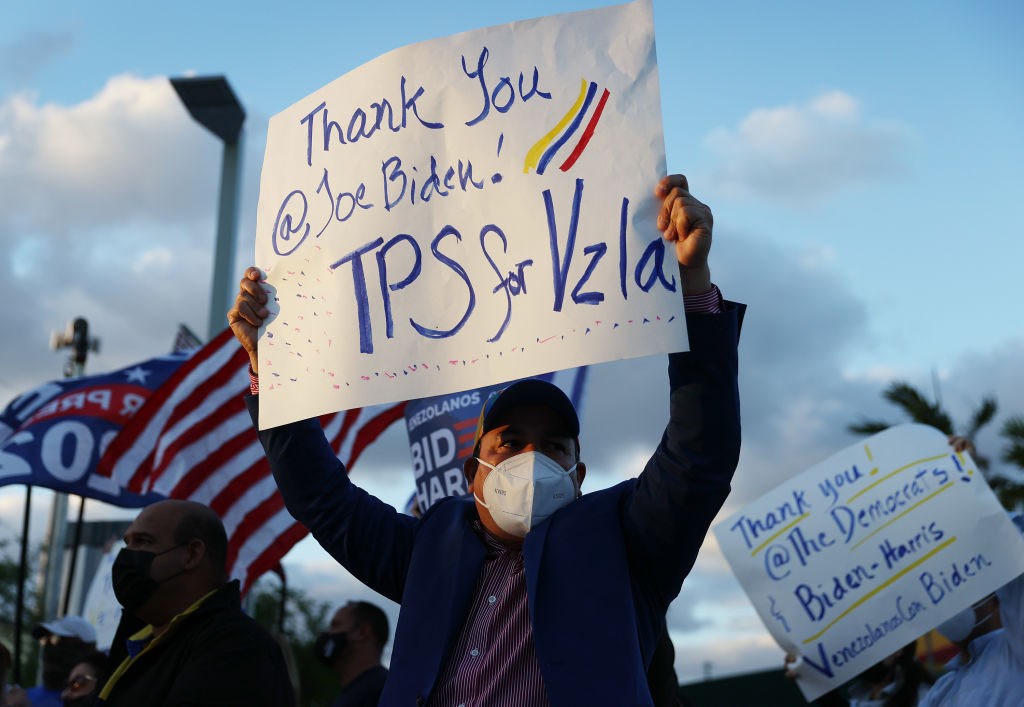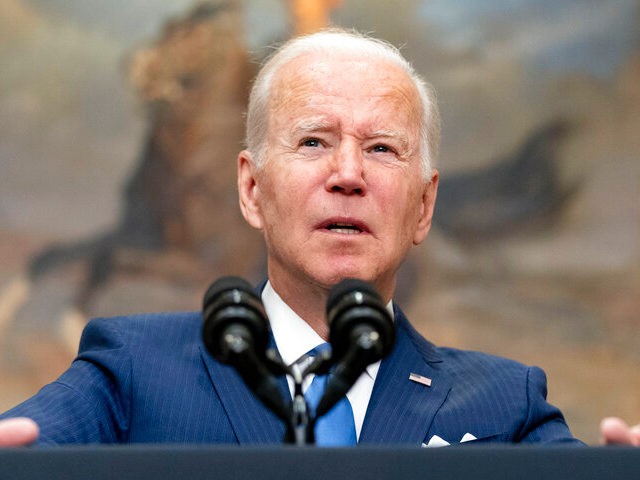Multiple anonymous senior officials told reporters on Tuesday leftist President Joe Biden is planning to soon ease sanctions on dictator Nicolás Maduro of Venezuela, including sanctions that prevent negotiations between American oil companies and Petróleos de Venezuela (PDVSA).
PDVSA is Venezuela’s state-run oil corporation. Venezuela is home to the world’s second-largest known oil reserves (after the United States) and, prior to the rise of socialism in the late 1990s, was Latin America’s wealthiest nation. Under Maduro and his predecessor Hugo Chávez, the Venezuelan socialist regime replaced experienced engineers and corporate leaders at PDVSA with inexperienced cronies, resulting in a catastrophic collapse of production. Venezuela’s current oil production stands at 1940s levels.
The reported easing of sanctions follows an admission by the White House in March that Biden had sent representatives to Caracas to meet with Maduro, reportedly to discuss buying Venezuelan oil. The Biden administration did not confirm the nature of those discussions, though the prospect of buying oil from the Maduro regime, a Russian proxy, to avoid buying oil from Russia outraged many in the Venezuelan diaspora.
Maduro himself confirmed the talks. He has also enthusiastically supported Russian strongman’s invasion of Ukraine – the event that reportedly prompted Washington-Caracas talks – offering “complete backing to President Vladimir Putin in the defense of peace of Russia in the defense of peace in that region, in the valiant peace of his people and his fatherland.”

Eleazar Guevara, originally from Venezuela, and others gather in front of the El Arepazo restaurant to show their support for an order signed by U.S. President Joe Biden that grants temporary protective status for thousands of Venezuelans on March 09, 2021 in Doral, Florida. (Joe Raedle/Getty)
It also follows an official announcement this week that the Biden administration would lift restrictions on remittances to Cuba, a key source of income for the communist regime there, and reinstitute “people-to-people group travel,” an exception to the barely existent “embargo” that would allow for poorly disguised group tourism under the guise of “educational” interactions with the Cuban people.
The global news agency Reuters reported on Tuesday that the Biden administration would soon “authorize U.S. oil company Chevron Corp (CVX.N) to open talks of its own with Maduro’s government, temporarily lifting a U.S. ban on such discussions.” The Biden administration is also rumored to be preparing the lifting of sanctions on one of Maduro’s nephews, former PDVSA official Erik Malpica.
“It does not allow (Chevron) entry into any agreement with PDVSA or any other activity involving PDVSA,” anonymous Biden officials reportedly claimed. “So fundamentally what they’re doing is just allowed to talk.”
Maduro’s vice president, Delcy Rodríguez – who has bizarrely claimed in the past American humanitarian aid causes cancer and the U.S. dollar “does not exist” – confirmed reports of a sanctions deal on Tuesday.
“The Bolivarian Government of Venezuela has verified and confirmed the news published to the effect that the United States of America has authorized U.S. and European oil companies to negotiate and restart operations in Venezuela,” Rodríguez wrote on Twitter in English, claiming the Venezuelan people were “proud” of the Maduro regime.
The world knows that Venezuela has taken the first steps on the road to economic recovery with its own efforts, denouncing and overcoming the illegitimate sanctions and the inhumane blockade. Our people are proud of the work and achievements of recent times.
— Delcy Rodríguez (@delcyrodriguezv) May 17, 2022
The anonymous American officials claimed that Venezuelan opposition politicians requested the gift to Maduro.
“The United States is undertaking a number of measures at the request of the Venezuelan interim government and the Unity platform of opposition parties negotiating with the Venezuelan regime, to support their decision to return to the negotiating table in Mexico City,” an unnamed U.S. official told the Agence France-Presse (AFP), as quoted in a report on Tuesday.
The “Unity” platform is a coalition of extremely unpopular Venezuelan politicians, many of them members of explicitly socialist political parties, who identify themselves as part of the anti-Maduro “opposition.” These politicians have called for “negotiations” with the Maduro regime on humanitarian grounds. The legitimate president of Venezuela, Juan Guaidó, has supported further talks in the name of helping the Venezuelan people.
“Unity is a daily [work in] construction,” Guaidó said on Monday, sharing an official statement from his presidential office approving of talks with the Maduro regime. “Union is a duty of those of us who confront dictatorship. To [govern] the majority, one must organize it, be inclusive, and have clear rules of the game – this is the direction the Unity Platform is advancing towards.”
Guaidó claimed that the talks would make a free and fair presidential election, presumably organized by Maduro, more likely.
“They owe us Venezuelans a presidential election; achieving the date of that election is to achieve a date for the end of the dictatorship and the return to democracy,” Guaidó claimed.
A los venezolanos nos deben una elección presidencial; lograr la fecha de esa elección es lograr una fecha para el fin de la dictadura y el regreso de la democracia, y así poder reunificar las familias y ver prosperar a Venezuela.
— Juan Guaidó (@jguaido) May 16, 2022
Neither Guaidó nor Maduro were elected in a legitimate national vote. Maduro has organized nearly a dozen rigged regional and presidential elections since seizing power after Chávez’s death in 2013, the latest a presidential “election” in 2018 that he “won” with record low turnout in a climate of intimidation, mass arrests, and mass reports of irregularities. That election prompted the National Assembly to use its constitutional powers to swear Guaidó into the office of the presidency, making him legally the true chief executive of the country. As Guaidó has failed to command the respect of the armed forces and has wrested no power out of Maduro’s hands, he has failed to be in any practical sense the president of the country.
Guaidó’s failure to end socialism in the country, and seeming lack of disposition to do so, has made both him and the establishment “opposition” in the country widely unpopular. According to a poll published by the firm Meganálisis this month, nearly 80 percent of Venezuelans agree that most “opposition” politicians are “sellouts to the government and work for chavismo.”
Meganálisis CEO Rubén Chirino Leañez told Breitbart News in early May that the opposition is seen as “doing absolutely nothing” to end socialism.
“That is also part of the element of distrust — they end up not being a political offering totally against socialism. On the contrary – they are appendices, a variant, or often just perceived as the same thing,” he explained.
Politically Persecuted Venezuelans in Exile (Veppex), an organization opposing the Maduro regime abroad, called the opposition’s plan to return to talks a “mockery” of the suffering of the Venezuelan people in remarks on Tuesday.
“This action is a clear recognition of Nicolás Maduro as president and a mockery of all Venezuelans and countries in the international community who believe in the end of the usurpation [of the presidential office], a transition government, and free elections,” Veppex President José Antonio Colina said, according to the Venezuelan outlet Runrunes.
The Biden administration, through the State Department, has pressured the Guaidó group to return to the negotiating table with Maduro, despite the complete failure of multiple rounds of talks in the past decade to result in any benefits for the Venezuelan people.
Follow Frances Martel on Facebook and Twitter.

COMMENTS
Please let us know if you're having issues with commenting.